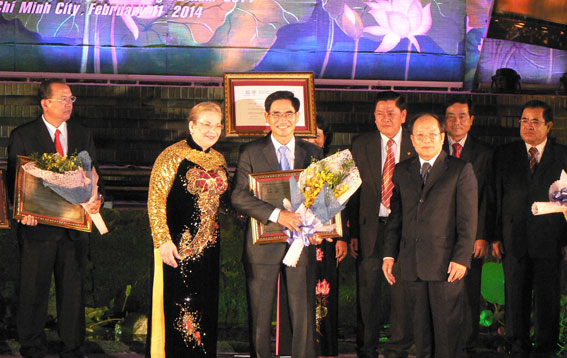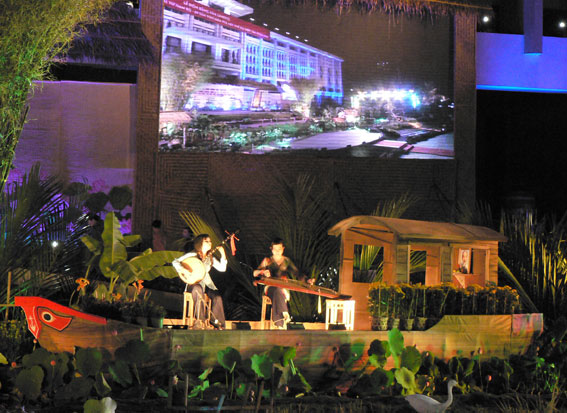
(ĐN)- A solemn ceremony was held in HCM City on February 11 to mark recognition of 'don ca tai tu', the genre of Vietnam's southern folk music, as an Intangible Cultural Heritage of Humanity by UNESCO.
(ĐN)- A solemn ceremony was held in HCM City on February 11 to mark recognition of ‘don ca tai tu’, the genre of Vietnam’s southern folk music, as an Intangible Cultural Heritage of Humanity by UNESCO.
 |
| Head of the UNESCO representative office in Vietnam Katherine Muller-Marin handed the certificate to Hoang Tuan Anh, the Minister of Culture, Sports and Tourism. |
The event was attended by Prime Minister Nguyen Tan Dung and senior leaders of the government as well as leaders and artists of 21 provinces and cities that are home to tai tu music, including Dong Nai province.
Addressing at the ceremony, Prime Minister Nguyen Tan Dung expressed his pleasure at seeing the genre of Vietnamese traditional music recognized as humanity’s heritage.
He also requested the Ministry of Culture, Sport and Tourism, related agencies, artists, and all people, with the love and the responsibility for ‘don ca tai tu’ to cooperate and deploy effectively the national action program to preserve and develop the music form so that it will always be preserved and play a worthy role in the spiritual life of Vietnamese people and humanity.
 |
| Vice Chairman Tran Van Vinh of Dong Nai provincial People’s Committee receives UNESCO’s certificates to the provinces and cities for contributions to preserving and developing the traditional art forms. |
On behalf of UNESCO, Head of the UNESCO representative office in Vietnam Katherine Muller-Marin handed the certificate to Hoang Tuan Anh, the Minister of Culture, Sports and Tourism.
She said tai tu music has helped bring people closer together and was an essential part of life of Vietnamese living in the southern region.
The UNESCO representative also presented UNESCO’s certificates to 21 provinces and cities in recognition to their contributions to preserving and developing the traditional art forms.
At the ceremony, artists from the southern provinces and cities including Dong Nai performed ‘don ca tai tu’ music to mark its recognition as a world heritage.
 |
 |
Don Ca Tai Tu was announced by the UNESCO as an Intangible Cultural Heritage of Humankind on December 5, 2013 during UNESCO’s 8th session of the Intergovernmental Committee for the Safeguarding of the Intangible Cultural Heritage, in Baku city, Azerbaijan.
It is the eighth Vietnamese cultural heritage to be honoured with the title, together with the worship of Hung Kings in Phu Tho province (2012); Giong festival of Phu Dong and Soc temples, Gia Lam district, Hanoi (2010); Quan Ho (love duet singing) in Bac Ninh province and Ca Tru (ceremonial singing) (2009); Nha Nhac(Vietnamese court music) in Hue imperial city, and the Space of Gong Culture in the Central Highlands region (2008).
Reported by V.T





